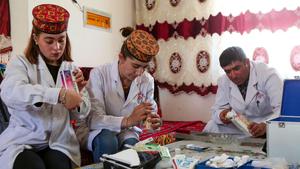 Local medical workers help check medicines at a herdsman's home in rural Tashikurgan Tajik autonomous county, Xinjiang Uygur autonomous region, on July 6, 2019. (PHOTO / XINHUA)
Local medical workers help check medicines at a herdsman's home in rural Tashikurgan Tajik autonomous county, Xinjiang Uygur autonomous region, on July 6, 2019. (PHOTO / XINHUA)
A spokesman in the Xinjiang Uygur autonomous region said a recent report claiming thousands of Uygurs are used as "forced labor" outside the region was fabricated.
A recently published report called "Uygurs For Sale" estimates that over 80,000 Uygur people were transferred out of Xinjiang to work in factories across China as "forced labor".
The report was issued by the Australian Strategic Policy Institute on Feb 28. The ASPI alleged they have identified 27 factories in nine Chinese provinces that are using Uygur labor transferred from the region between 2017 and 2019.
The report aims to cooperate with the United States in its conspiracy to disentitle Xinjiang laborers, suppress Chinese enterprises and affect foreign companies' confidence of investing in China.
Ilijan Anayt, Spokesman for the Xinjiang government
ALSO READ: Uygurs upset by ‘missing’ allegations
Kashgar, Hotan and Aksu prefectures, along with Kezilesu Kirgiz autonomous prefecture, in southern Xinjiang are recognized by the country as severely underdeveloped areas with frail environments, frequent natural disasters and huge, impoverished populations.
"It is the responsibility of governments at all levels of the region to do their utmost to help these poverty-stricken people to get employed, get rid of poverty and lead happy lives as soon as possible," Ilijan said.
"Local authorities are creating more job opportunities at local markets, seeking employment in other places in Xinjiang and organizing transferred employment out of Xinjiang through a 'pairing-up' support mechanism between Xinjiang and other provinces to increase the incomes and shake off the poverty of the people in the region," he added.
Since 2018, the region has helped 151,000 impoverished people in southern Xinjiang find employment. Among them, 14,700 people found jobs in factories and companies in other provinces.
"Their average annual income is 45,000 yuan (US$6,500), which is much higher than they could get through agricultural production in southern Xinjiang," Ilijan said. "And no doubt, all of them and their families have been lifted out of poverty."
For instance, Paxiagul Kerem, a low-income farmer who used to live in Wuqa county in Kezilesu Kirgiz, voluntarily signed up to work at an enterprise in Dongguan, Guangdong province.
Now she could earn 45,000 yuan a year, and with her help, more than 500 people from her hometown also went to work in Dongguan, giving them the opportunity to escape poverty.
READ MORE: Vocational trainees find good jobs
In another case, Raykhangul Yimir, a woman who used to live in poverty in Amashi, a small village in Kezilesu Kirgiz, worked for four years in a factory in Cixi, Zhejiang province. She sent home over 100,000 yuan of her earnings. Now, her family can build a new house and their lives have improved greatly.
"Seeing that their relatives and friends are earning a fortune outside Xinjiang, more and more people in southern Xinjiang are showing strong interest in signing up at local human resources markets for opportunities to work in other provinces," Ilijan said.
After the report was released, some employers who hired people from the region said they were deeply shocked. They claimed that the writers did not make a comprehensive investigation and told a false story.
According to a statement from Dong Guang Yidong Electronic Technology, its workers from the region voluntarily left Xinjiang to work in its factory in Hubei province, and they cherish the opportunity to work there.
"Neither the regional authorities nor the employer has forced any of them to do anything they didn't want to do, and like all the other laborers, workers from Xinjiang in other parts of China enjoy equal rights in accordance with law," said Ilijan.
"As for their salaries, we have carried out some surveys on this. The average income for migrant workers from Xinjiang is over 3,500 yuan monthly, and the highest reaches 6,000 or 7,000 yuan, which is much more than they could earn working on farms back home," he added.
Mao Weihua contributed to this story.
Contact the writers at aibek@chinadaily.com.cn


